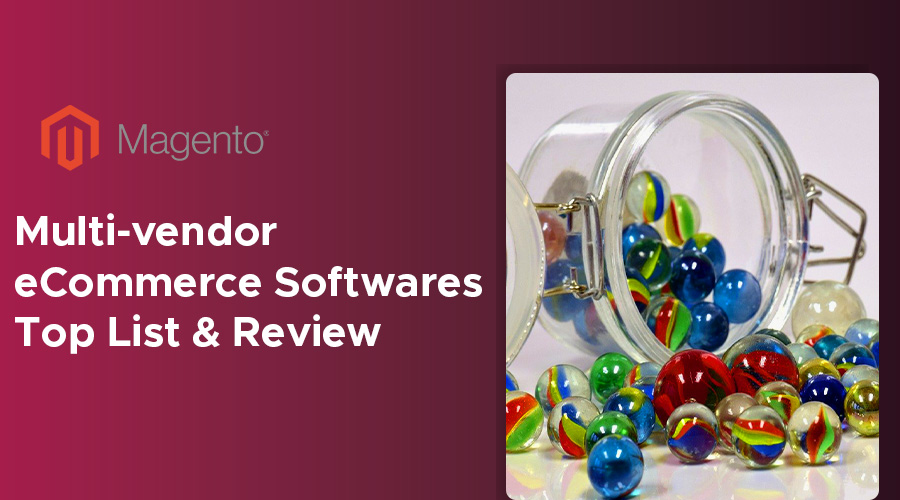
There is no doubt that eCommerce is in its bloom period. With the pandemic continuing, there is a movement in consumer and seller behavior: offline transactions are shifting to online platforms.
As you go through a few popular names such as eBay, Amazon, or Etsy, you might have thought about having a platform of your own. Those websites are called multi-vendor eCommerce marketplaces and you are completely capable of creating a similar website for your sellers.
This article will help you explore everything you need to know about the multi-vendor online marketplace, why you would want to build them, the multi-vendor eCommerce softwares that support the process effectively, and how to choose the right one among them.
Table of Contents
I. What Are Multi-vendor eCommerce Websites?
Multi-vendor eCommerce marketplace websites are platforms where different vendors operate their businesses. Think of it as an online mall where you can go to one place and have access to many brands and shops.
If you run this online marketplace, you are the connector between third-party buyers and sellers. There would be a commission from those who use your platform to make transactions. In return, you, the operator, will handle the functionality and design of your online mall.
II. What Are Differences Between Multi-vendor eCommerce Websites And Normal eCommerce Platforms?
A normal eCommerce platform is where you can build your online store the way you want. It provides the necessary tools that allow you to have complete control over your shop look, performance, marketing, and navigation. In this model, you sell your goods and services. There is no on-site competition from fellow sellers.
Meanwhile, a multi-vendor eCommerce website is a form of the online marketplace. Sellers who do not want to spend too much effort in creating something new can start immediately. With different sellers gathering in one place, buyers have more options to choose from. Vice versa, as a seller, you also have a larger pool of customers to attract.
III. Why Should You Create Your Own Multi-vendor eCommerce Websites?
1. Create your own unique online marketplace

All currently popular multi-vendor eCommerce marketplaces possess distinct features, target customers, and business models. Amazon, being more like a conventional marketplace, relies mostly on third-party sellers’ product listings to attract customers while eBay’s model is closer to an auction house. On the other hand, Etsy focuses on art, handcrafted, and vintage things, which essentially gives off the creative and unique feelings most artisans look for.
Hence, if you have in mind a different business model or potential customers, you would want to create an eCommerce marketplace to properly portrait your idea.
2. Your target customers can find a wider variety of services and goods
Having a large number of goods with great diversity from different sellers can help you attract more customers, which, in turn, will make your online sales platform more inviting to new vendors.
3. You can collect data to use in future marketing and business plans
Having a marketplace provides you with a larger amount of data, which can be of great importance to the personalization of the eCommerce experience, from which you can enhance targeted ads contents, design, and user satisfaction.
4. Extra features for extra commission
You can provide your sellers and buyers extra and useful features for extra commission. For instance, sellers on your marketplace website can use premium listing segments to reach more potential customers.
IV. What Features Should You Consider When Creating Multi-vendor eCommerce Websites?
The features required are different from vendors’, buyers’, and admin’s points of view.
1. Multi-vendor eCommerce websites extensions features for vendors
Effortless products registration/listing/arrangement
The faster the process of registering and arranging products to stores, the better the whole experience is for both vendors and buyers. Besides, an easy-to-manage listing page would be a clear map for customers to navigate around.
Accessible and effective sellers dashboard
This function allows vendors to manage their products, sales, inventory, and other necessary data all in one place.
Insert/Extract data
An extension that can help sellers to automate the process of putting in and taking out data would be of great help, especially for large stores.
Multi-store function
Some vendors sell several more than one category of products. They need a platform that allows them to create more than one store under one account.
Multilingual

International sellers and buyers would be interested more in your website if the platform is multilingual or there is an integrated translating feature.
Location
Established locations of vendors help attract more local customers.
Shipping options and information
A wide range of shipping companies available for sellers to choose from would be a plus in terms of convenience. Also, estimated shipping fees and time calculations help enhance their customer services.
2. Multi-vendor eCommerce websites extensions features for buyers
Product reviews
The product reviews section, besides giving purchased customers a place to voice their opinion, gives a clear idea to others before buying.
Communication channel
A communication channel for all parties, sellers, buyers, and admin, is a requirement for a better user experience and problem-solving.
Comparison table
This feature is highly recommended from a customers’ point of view. It significantly reduces the time a buyer spent looking for reviews in different places to be able to conclude which product to purchase.
Purchase from multiple sellers using the same cart
So much effort can be saved by this feature considering shopping in a marketplace website with many different vendors.
3. Multi-vendor eCommerce websites extensions features for operators
Simple vendor registration
As important as it is for vendors, a simple registration process also benefits the website admin since a too complicated first step can discourage many potential sellers.
Commission fees management system
The admin can set and manage subscription plans with different conditions and requirements for various types of sellers.
Backend control
The admin being able to configure multi-vendor modules from the backend is definitely a vote-up for a great operating experience.
Advanced reports
Detailed statistics allow the admin to keep track of everything and also enable significant improvements in the next change/update.
V. Top Multi-vendor eCommerce Softwares In 2021
An online marketplace with many vendors is not a small-scale model. That is why multi-vendor eCommerce website extensions would make your life a lot easier. Below are our reviews on the best extensions available in 2021.
1. Landofcoder Magento 2 Marketplace Extension
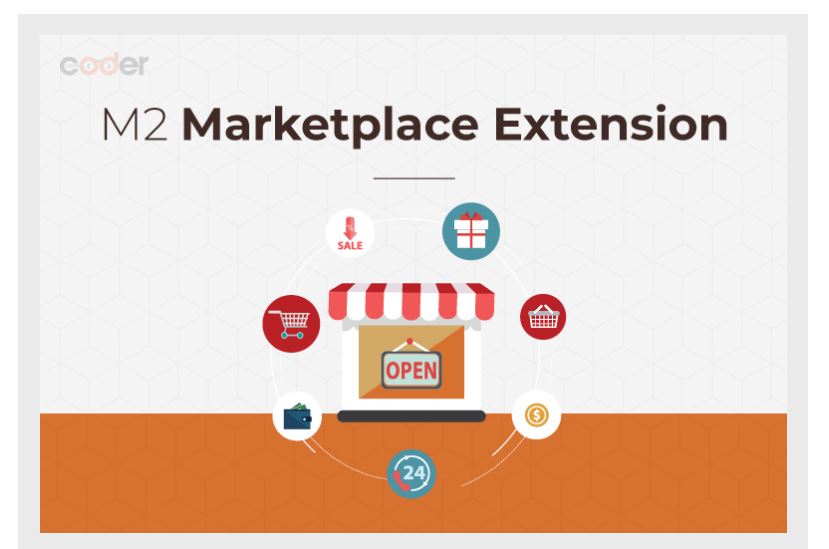
Magento 2 is an open-source marketplace, which means to create or customize something on your own, you need to be a skilled coder.
Easy to use and affordable, Landofcoder Magento 2 Marketplace Extension / Magento 2 Multi-Vendor Extension helps to convert your eCommerce store into a completely active multi-vendor marketplace like Amazon, Etsy or eBay, etc. with little effort in terms of coding.
This extension, which brings you all the features mentioned in the previous part at a reasonable price, is an excellent solution for your multi-vendor eCommerce website.
Noteworthy features: Multiple Payment Gateways Integrated, Advanced Report Supported, Approve sellers & products automatically/ manually, Upload Multiple Products In Bulk and PWA ready, REST API, GraphQL.
Pros:
- Highly flexible Magento 2 themes compatibility.
- 100% open source. Easy to customize.
- Powerful SEO management.
- Affordable.
- Supportive technical team.
Cons:
- It is an extension, therefore it is not for you if you are looking for a standalone platform.
Compatibility: Magento Magento 2.2.x, 2.3.x, 2.4.x
Cost: One-time payment starts from $299.
2. Arcadier
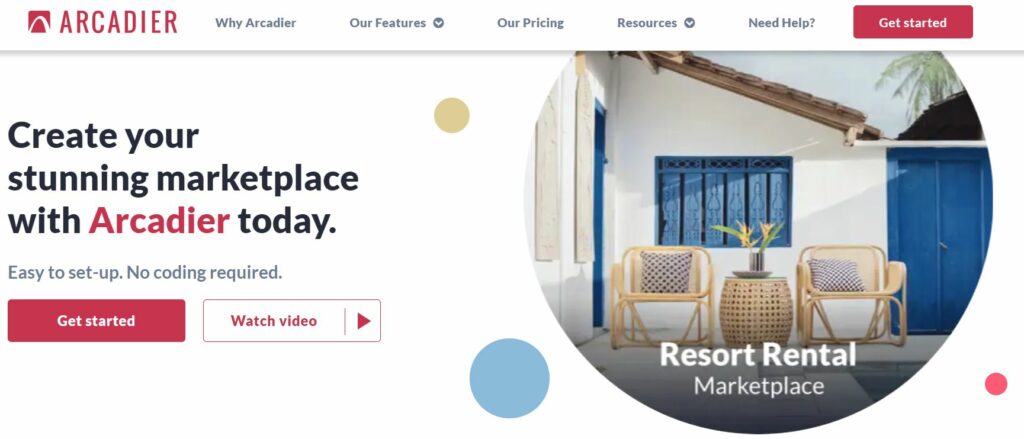
Founded in 2013, Arcadier is a Software-as-a-Service (SaaS) marketplace website builder that enables enterprises, entrepreneurs, start-ups, local communities, and large brands to create and manage their multi-vendor websites easily and affordably.
While some other SaaS marketplace provides users with one template for all objectives, Arcadier presents many options ranging from buying & selling goods, booking services to renting things.
Noteworthy features: ratings & reviews, multilingual capabilities, the ability to integrate the vendor’s own payment providers, Google Analytics integration, and private marketplace optionality.
Pros:
- The interface is user-friendly.
- The customizability level suits either novices or professional programmers.
- Affordable.
Cons:
- You do not own it 100% because it is a SaaS platform.
- It might get difficult if you want to create something more complex.
- From reviews, the cost surges if you need any feature that involves API.
Cost: Monthly payment starts from $68.
3. Yo!Kart Multi-Vendor Solution

Yo!Kart is a self-hosted multi-vendor software that provides organizations a package of essential features for their online marketplace plan. Despite being a relatively young player (founded in 2015) in the market, Yo!Kart is gaining popularity with its effectiveness and cost-efficiency.
Noteworthy features: Multi-currency, Multi-lingual, User Management, Customer Order Management, Discount Coupon Management, Product Catalog, Content Management System (CMS), and Separate Vendor Storefronts.
Pros:
- Affordable in the long term.
- SEO-friendly structure.
- The support team is responsive.
Cons:
- Many users see the platform as inflexible, in many situations a code change is required.
- Might have to pay for future upgrades.
- As it is rather comprehensive, owners need to invest time in learning how to use the system.
Cost: One-time payment starts from $999.
4. Cs-Cart Multi-Vendor Software

The CS-Cart Multi-Vendor Software focuses primarily on providing operators many essential features to create a multi-vendor website quickly and simply. The sellers would have their own backend panel and a digital storefront, which brings great control over their business.
Noteworthy features: Mobile App, Advanced Vendor Payout System, Configurable Vendor Plans, Multiple Levels of Administrative Access, and Flexible Product Approval System.
Pros:
- Easy to set up and run.
- Customizable.
- Feature richness.
Cons:
- Some owners reported delays in customer support.
- The translating feature has some problems.
Cost: One-time payment starts from $1,450.
5. Shopygen – Genstore Script
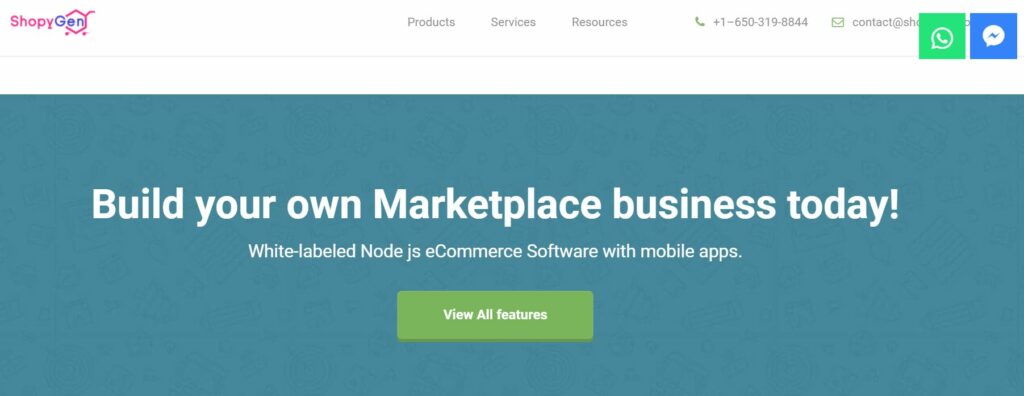
Shopygen’s Genstore is a multi-vendor marketplace script for Genstore which is an open-source Node.Js eCommerce platform. It provides the technology stack for massive eCommerce businesses like Amazon, eBay, and PayPal, promising to bring quality code and detailed documentation.
Noteworthy features: Robust Admin Panel, Unique Seller Dashboard, Android & iOS App, Newsletter Management, and Revenue Channels.
Pros:
- Highly customizable.
- Offers both multi-vendor and only-operator selling features.
- The company provides free deployment and training services.
Cons:
- The deployment is trickier than other pre-made solutions.
Cost: One-time payment starts from $699.
6. BigCommerce Multi-Vendor
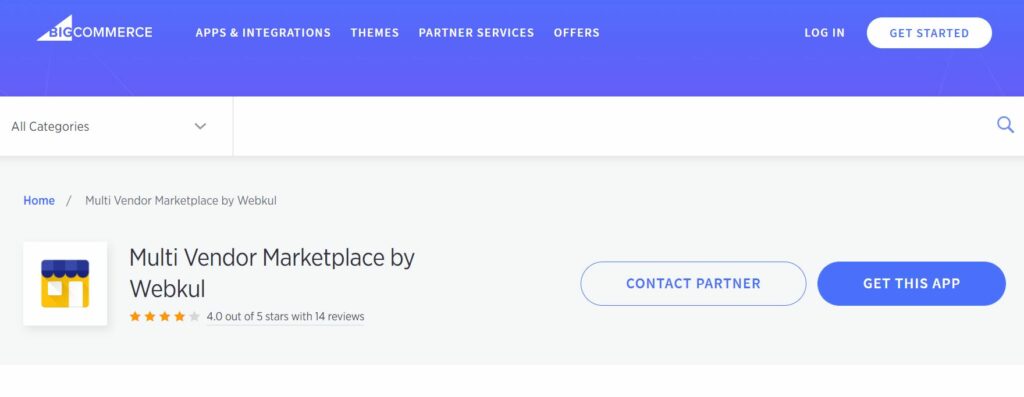
As well-known an eCommerce platform as it is, BigCommerce does not provide multi-vendor eCommerce websites extensions for its users. Rather, third-party developers come in with extensions for those who want to create a multi-vendor marketplace. BigCommerce Multi-Vendor of Webkul is a simple and effective extension for this objective.
Noteworthy features: Admin Access and Control Panel, Flexible and Hassle-Free Seller’s Subscription Plan, Actionable Seller Panel, and Hassle-Free Product Management and Approval.
Pros:
- Easy to use.
- Many positive reviews for responsive customer services.
Cons:
- Some owners experience delays in customer support.
- Users cannot export store reports.
- The products are not synced automatically.
Cost: Monthly payment of $10.
7. ZielCommerce Multi-vendor Marketplace Software
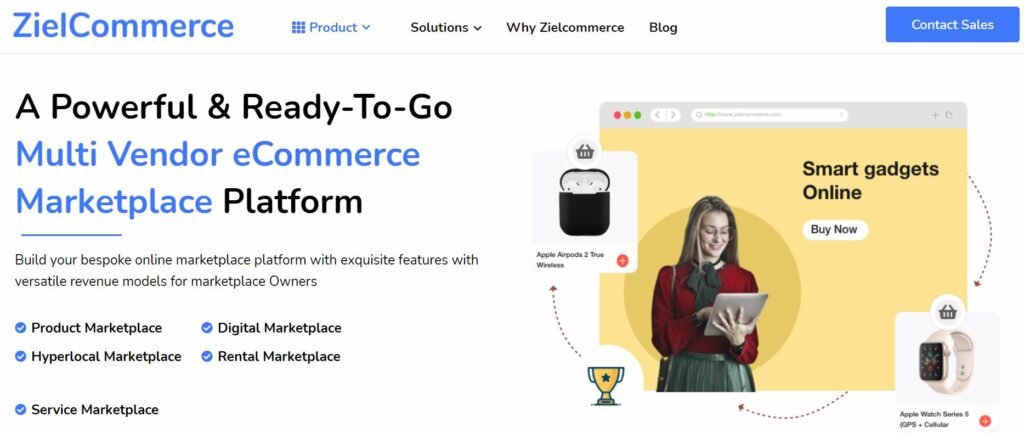
As a white label-enabled Enterprise-grade software, ZielCommerce allows you to create your own multi-vendor eCommerce website with the support of a powerful technology stack.
Noteworthy features: Reporting & Analytics, Enriched UI/UX Experience, Featured Blogging Suite, Google Shopping API, Multi-Lingual Support, and The Commission Model.
Pros:
- Fully SEO-Friendly
- User-friendly interface.
- Highly customizable.
Cons:
- Some found it hard to navigate at first.
Cost: One-time payment. Need to contact sales for price information.
8. WordPress Dokan Plugin
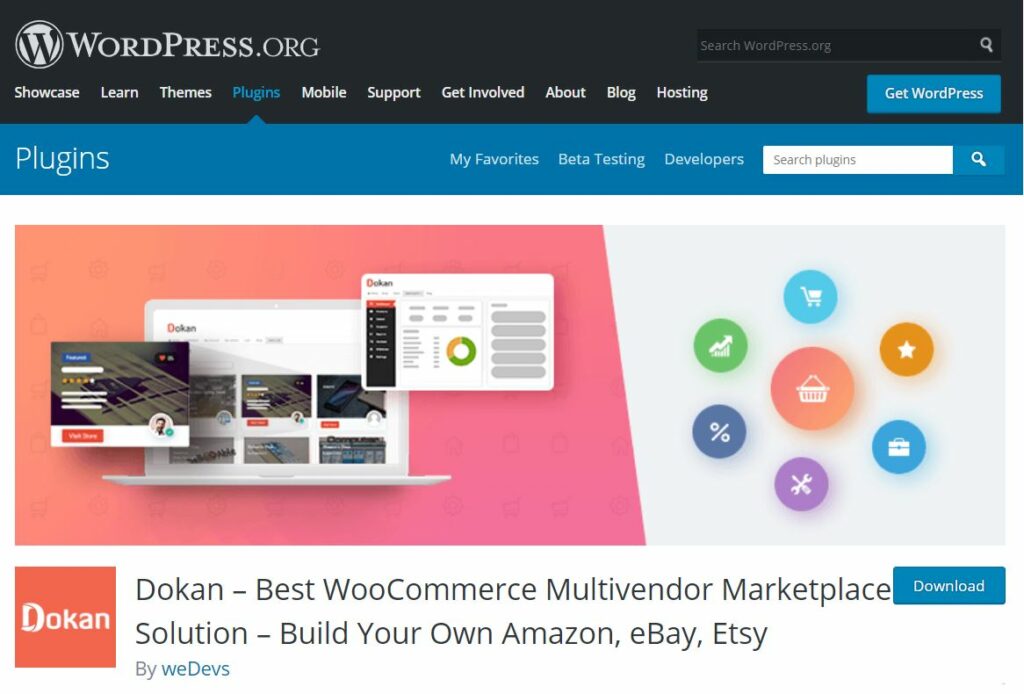
Powered by WooCommerce, Dokan is a simple and capable multi-vendor marketplace plugin for WordPress. The plugin comes with a range of extensions that you can choose based on your priorities.
Noteworthy features: Use Any WooCommerce Compatible Theme, Frontend Dashboard for Vendors and Customers, Store Insights with Reports and Statement, and Coupon Management.
Pros:
- Easy setup.
- Excellent basic functionality.
- Affordable.
Cons:
- Delays in support from the customer service team due to different timezone.
- More advanced features need to be added to the plugin.
- Some users experience bugs.
Cost: Free. Open for donations.
VI. How To Choose The Right Multi-vendor eCommerce Softwares?
To choose the right multi-vendor eCommerce websites extensions or software, you need to understand their models. For example, the Magento platform, SaaS platforms, and self-hosted solutions are all different. The self-hosted solutions are more tricky and require a higher level of coding skill, but in turn, provide you a wider space for customization and control. On the other hand, a SaaS model requires a monthly payment, but many managed services would come in handy. If you have a Magento store or are thinking about having one, then we highly recommend trying the affordable and effective Landofcoder Magento 2 Multi-Vendor Extension.
Besides budget, the duration of your plan should also be considered to choose a suitable package. If you have not had a long-term plan, one-time payment solutions might not be very cost-effective, or even risky.
All in all, it depends on your priorities, objectives, and detailed understanding of the mentioned solutions to choose the right option.
Our big thanks go out to every vendor that has made this Best Multi-vendor eCommerce Softwares list! This is the most comprehensive list of the best Best Multi-vendor eCommerce Softwares on the Internet and it’s our honor to have you as part of this!
If you want to add or remove any item in this list, feel free to submit your extension at Submit form.
Stay tuned. We will come back with more informational reviews!
Thank you and stay safe!
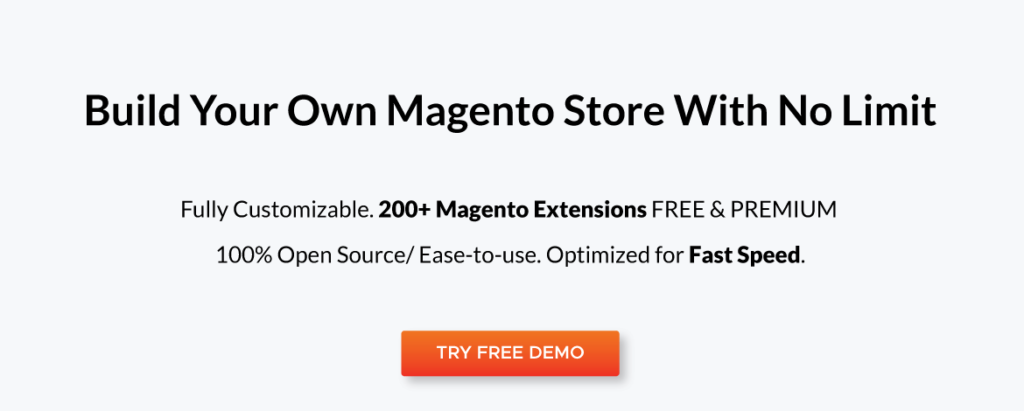







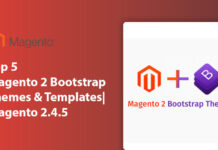



![[SALE OFF] Discount 30% All Premium Extensions On Christmas And New Year 2025 christmas-and-new-year-2025](https://landofcoder.b-cdn.net/wp-content/uploads/2024/12/christmas-and-new-year-2025-1-218x150.png)






